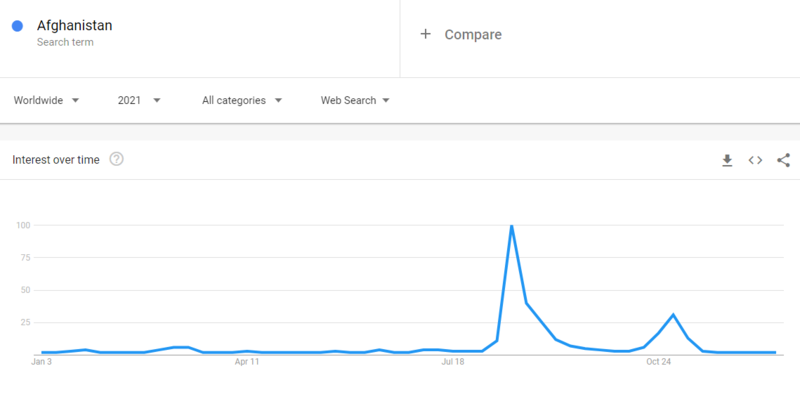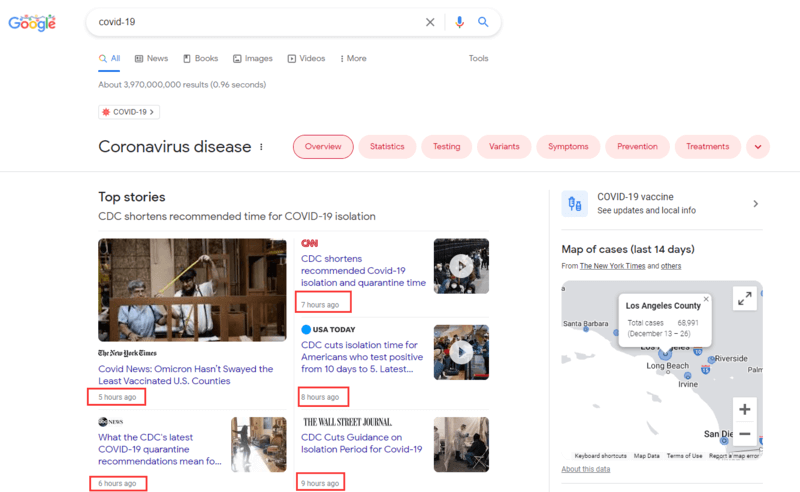Google Freshness Algorithm: Does Fresh Content Impact SEO?
According to all SEO best practices, you must have heard that republishing content on your website is a proven way to lure the Google freshness algorithm and increase organic traffic.
But what is the Google freshness algorithm and how freshness factor impacts your SEO. Most importantly, how can we use Google’s Freshness Algorithm to increase website traffic?
We answered all these questions in this post.
Let’s get started.

Contents
What is Google Freshness Algorithm and QDF?
Google Freshness Algorithm was rolled out by Google at the end of 2011. The key intention of this update is to provide greater emphasis on the updated content tied explicitly to areas such as news, events, politics, etc. and more precisely where the user is expected to know most current information.
Google scores freshness by using its QDF (query deserves freshness) algorithm to determine whether or not a particular piece of content is relevant for a specific search query that requires up-to-date search results.
Query Deserves Freshness (QDF) are queries that suddenly became very popular at one point of time compared to its normal activity. For example, for the keyword “Afghanistan”, the number of queries made for the keyword are relatively stable but spikes drastically when Taliban controls it.
In this case, Google notices the keyword and try to give a fresh result onto that to its visitors. To address this situation, Google analyzes the websites related to that keyword and show results on the basis of freshness they’re carrying.

Does The Freshness Algorithm Have a Big Impact On SEO?
When Google announced the freshness algorithm change on November 3, 2011, Google said that it impacted around 35 percent of total searches (6-10 percent of search results to a noticeable degree). So it is obvious that the freshness algorithm does have an impact on some websites’ SEO.
However, fresh content isn’t always equally important. There are certain types of searches that are far more sensitive to changes over time. For example:
- Recent events (e.g. natural disasters, sporting events)
- Hot topics (e.g. celebrity news, political movements)
- Recurring events and reports (e.g. presidential elections, annual conferences).
- Ongoing but always-changing information (e.g. product reviews or anything in the technology space).

There are also searches where freshness is less relevant. These are usually searches for evergreen content, which is content that stays relevant for a long period of time. For example:
- Food recipes
- Historical facts
- Broad topics
- Evergreen topics
All in all, if you want to rank at the top of Google for searches that fall into time-sensitive categories, your content has to be fresh. The best way to determine how important freshness is for a particular keyword is to search that query and look at the top 10-20 results.
Then, I still recommend you to update your content regularly, even if you’re not targeting queries that deserve freshness.
Here are the top reasons why you should get started on updating content:
- It’s easier to rank higher for content that’s already ranking rather than start from scratch with a newly published piece.
- Google has to update the date stamp for your content in SERPs, which increases the CTR. Users are much more likely to click on the most recently published piece of content over the other options.
- It encourages higher user engagement with your site.
If you’re covering a topic area and the information you have is out of date, time-sensitive, hasn’t been refreshed or updated in some time, or is simply being surpassed by more engaging, fresh and new competing content, it is time to keep your site updated with fresh content
How Does Google Measure Content Freshness?
Google estimates the freshness of your content based on many factors, including:
- Page inception date: The date it was indexed by Google.
- Amount of change to the updated page: Large changes signal more freshness.
- Number of changes to core content of the page: Changes to the main body content add more freshness than adjusting the date/time tags.
- Rate of page change: Frequent changes on the page signal more freshness.
- Rate of new page creation: Websites that add new pages more frequently may get a higher freshness score.
- Freshness of backlinks to the page: Links from sites that have high freshness scores can improve yours.
How to Optimize for The Google Freshness Algorithm
Now, you have known useful information about the basic concepts of the freshness algorithm, it is time to figure out how to increase the rank by the freshness algorithm.
1. Be The First in Content Production
Sites that work in the field of news, cinema, music, and day events should always try to provide the user with the information of the day more quickly rather than your competitors. If your site is the first source for the news of the day, you will send more users to it.
2. Update Existing Content
Updating your website content is a foolproof way of making it become fresher.
If you’ve found that your older posts have lost traffic or have sunk to the bottom of your Analytics reports it may be worthwhile to update them and republish them. Try updating these articles with up-to-date info, relevant current context, and with recent and trustworthiness sources/research. Ensure that “freshness” also means “needs met” for your readers.
When you update and improve the content, pay attention to how your content metrics change as a result. These insights can help you understand what works and what doesn’t for your brand.
3. Update The Time Stamp
Timestamps are included as a part of Google’s search results. This is reflective of the importance of freshness not just to Google’s freshness-loving algorithm, but to the freshness-loving users of Google, too.
- Search engine – the algorithm detects that your content has been updated
- Human behavior – when searchers scan the snippets on a search results page, they naturally tend to click on the ones that have the most recent date.
When you update and publish blog posts on some content-management-systems (CMSs) they often include a time-stamp or date that can appear in the search snippet. This can tell both Google and visitors when the original blog was published, or when it was updated.
We don’t recommend just update the time stamp without updating the content. Sometimes even if you change the updated date in your blog post (by faking a change), Google will not reflect that date in SERPs if the content is not changed.
The reason?
It is in the patent that Google filed in 2011.
It says,
“In order to not update every link’s freshness from a minor edit of a tiny unrelated part of a document, each updated document may be tested for significant changes (e.g., changes to a large portion of the document or changes to many different portions of the document) and a link’s freshness may be updated (or not updated) accordingly.”
– Document Scoring Based On Document Content Update, United States Patent Application
4. Publish New Content Regularly
If you add new content to your site on a regular basis and provide new information for visitors every time they click on your site, you will be making great strides to ensuring your website’s freshness.
Conclusion
With the introduction of the Google Freshness Algorithm, we can summarize that;
- Freshness is a ranking factor for Google but only for pages that target time-sensitive and trending queries.
- The best way to determine how important freshness is for a particular keyword is to search that query and look at the top 10-20 results.
- Freshness factors, like the current year in your title and the time stamp, can impact your CTR, which may result in higher rankings.
- Don’t just update the time stamp without updating the content.
Google uses over 200 ranking factors in its algorithm and freshness is only one of them. So, always consider the needs of your target audience when you are creating your content.
If your audience is in search of newsworthy content, then you’ll want to focus on creating fresh content and pay attention to the factors that the Google algorithm uses to determine freshness.
But if your website is based more on providing informational content that can be described as evergreen content, then don’t trip all over yourself in an attempt to frequently republish your content just to boost your freshness ranking.
Have you ever tried leveraging Google freshness factor? And, what’s the result you got? Tell us in the comment.
